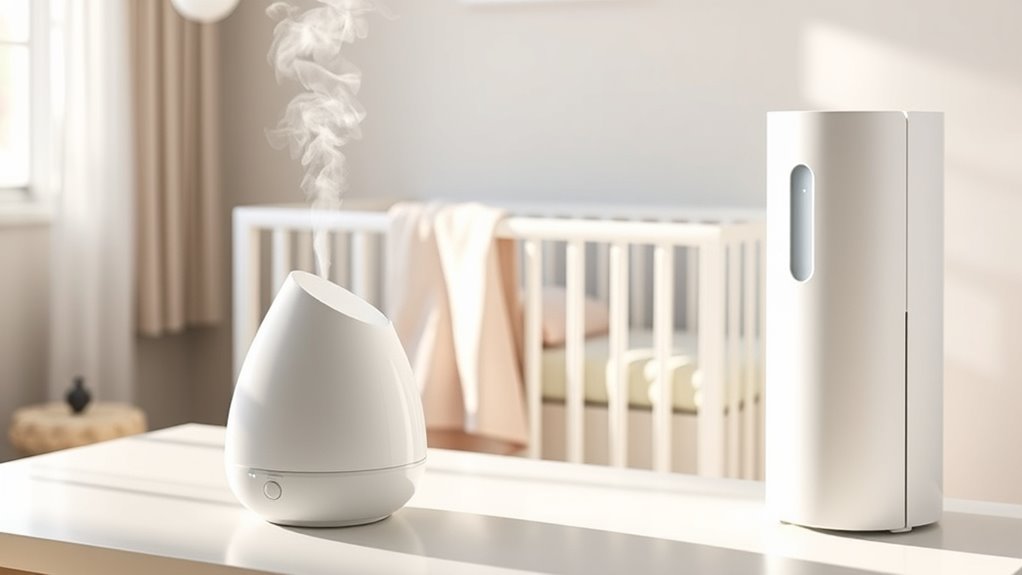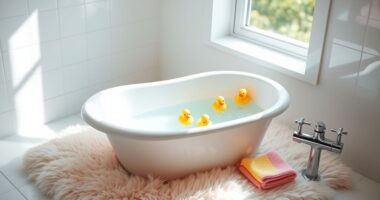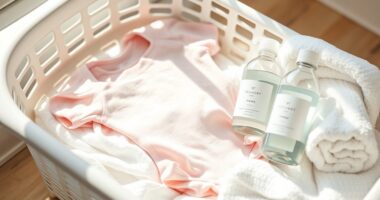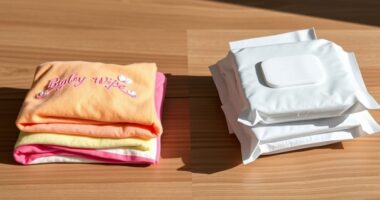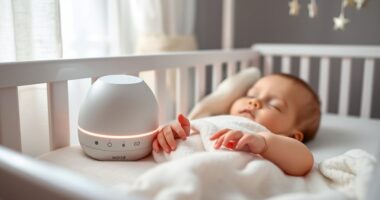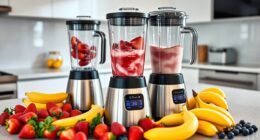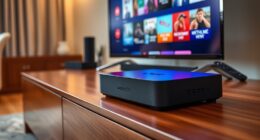To enhance your baby’s sleep environment, choose quiet humidifiers and air purifiers with noise levels below 30 decibels, ensuring peaceful, undisturbed sleep. Look for models with ultra-quiet motors and check reviews for noise details. Regularly clean and replace filters to keep devices running smoothly and quietly. Proper maintenance prevents disruptions and promotes a healthy, comfortable space. Keep these tips in mind to create a serene nursery — and more helpful advice awaits as you explore further.
Key Takeaways
- Choose ultra-quiet humidifiers and air purifiers with noise levels below 30 decibels to promote peaceful sleep.
- Regularly clean and maintain devices to prevent noise from dirt buildup and mechanical issues.
- Monitor for unusual sounds indicating the need for cleaning, filter replacement, or repair.
- Proper device maintenance ensures quiet operation, consistent humidity, and improved air quality for the baby’s comfort.
- Selecting low-noise, well-maintained devices creates a calm environment, supporting restful sleep for the baby.
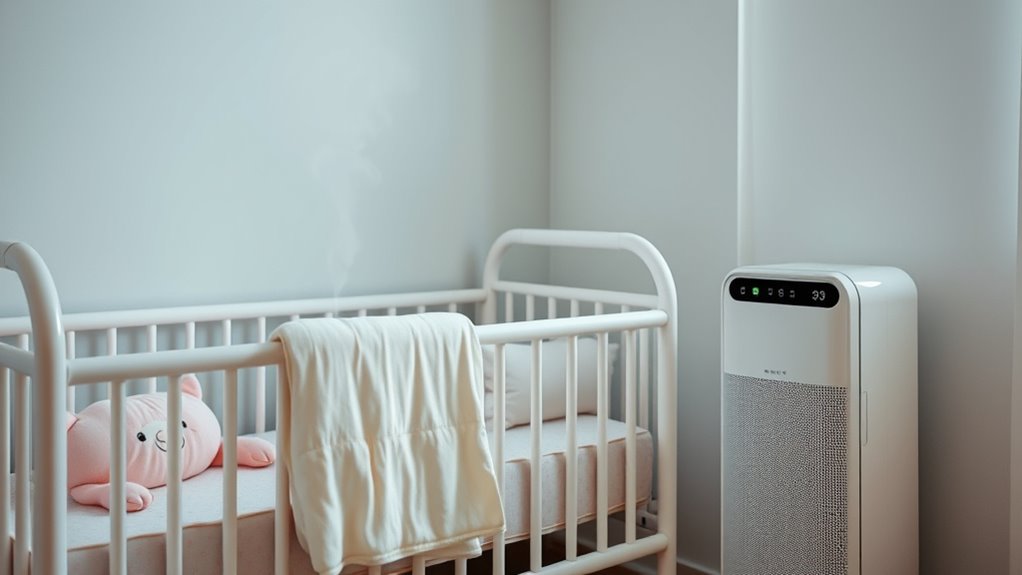
Humidifiers and air purifiers are vital devices for creating a healthier indoor environment, especially when it comes to your baby’s sleep space. As you select and set up these devices, it’s important to take into account factors like noise levels and maintenance routines, which directly impact your baby’s comfort and your peace of mind. A quiet humidifier or air purifier guarantees that your little one isn’t disturbed by loud operational sounds, allowing for more restful sleep. Many models now feature ultra-quiet motors designed specifically for nurseries, so you can run them through the night without worry. When choosing a device, check reviews or specifications for noise ratings, aiming for models that operate at a whisper-quiet level, typically below 30 decibels. This way, you can create a soothing environment that promotes uninterrupted sleep for your baby.
Equally important is establishing a consistent maintenance routine for these devices. Neglecting regular cleaning and filter replacements can lead to the buildup of mold, bacteria, or dust, which may compromise your baby’s health or cause respiratory issues. To keep your humidifier functioning properly, you should empty, clean, and dry it daily to prevent mold growth. Filter changes for air purifiers depend on the manufacturer’s recommendations but typically occur every three to six months. Keeping to these routines not only maintains peak performance but also minimizes noise levels caused by clogged filters or mineral deposits. Regular maintenance also extends the lifespan of your devices, ensuring they continue to provide a clean, humidified environment for your baby each night. Additionally, choosing devices with advanced filtration systems can further improve indoor air quality and safety.
It’s vital to monitor your devices regularly for any unusual noises or signs of wear. If you notice increased noise levels, it might indicate a need for cleaning or parts replacement. Staying consistent with maintenance routines also involves checking for leaks, replacing filters on schedule, and wiping down surfaces to prevent dust accumulation. By doing so, you guarantee that your humidifier and air purifier operate quietly and efficiently, creating a peaceful atmosphere conducive to your baby’s sleep. Remember, a well-maintained device is less likely to malfunction or produce disruptive sounds, making it easier for your little one to rest comfortably. Incorporating these practices into your routine gives you peace of mind, knowing that your baby’s sleep environment remains healthy, quiet, and cozy.
Frequently Asked Questions
Are Humidifiers and Air Purifiers Safe for Newborns?
Yes, humidifiers and air purifiers are generally safe for newborns if you choose devices with good safety features and low environmental impact. Always opt for models with automatic shut-off and filter indicators. Keep devices clean to prevent mold and bacteria buildup. Regular maintenance guarantees device safety, protecting your baby’s health. By selecting eco-friendly options, you minimize environmental impact while creating a safe, comfortable sleep environment for your little one.
How Often Should I Clean My Humidifier or Air Purifier?
Think of your humidifier or air purifier as a garden needing tender care. You should clean it at least once a week and replace filters according to the manufacturer’s schedule, usually every 1-3 months. Regular cleaning keeps mold and bacteria at bay, ensuring fresh air for your baby. Follow your device’s cleaning schedule diligently, and you’ll keep the air pure and your little one safe and comfortable.
Can These Devices Help With Allergies or Asthma in Babies?
Yes, humidifiers and air purifiers can help with allergy relief and asthma management in babies. They improve air quality by reducing airborne allergens like dust, pet dander, and pollen, which can trigger symptoms. Using these devices consistently helps create a healthier environment, easing breathing difficulties and reducing allergy or asthma flare-ups. Always choose suitable models and keep them clean to guarantee they effectively support your baby’s respiratory health.
What Are the Best Models for Small Nursery Spaces?
Imagine a tiny corner of your nursery filled with gentle, whisper-quiet comfort. For small spaces, choose models with compact designs that don’t clutter your room. Look for air purifiers and humidifiers with low noise levels so your baby sleeps peacefully without disruption. Brands like Levoit and Vicks offer sleek, effective options perfect for confined nurseries, ensuring clean, moist air while fitting seamlessly into your cozy space.
Do Humidifiers and Air Purifiers Reduce Winter Illnesses?
Yes, humidifiers and air purifiers can help reduce winter illnesses by improving air quality and supporting your baby’s respiratory health. They add moisture to dry winter air, easing congestion and coughing, while purifiers remove airborne germs and allergens. This combined approach helps prevent respiratory infections and keeps your baby healthier during cold months. Regular use of these devices creates a safer, more comfortable environment, promoting better sleep and overall well-being.
Conclusion
So, next time you think you’re doing enough by just cranking up the heat or opening a window, remember: a humidifier and air purifier could turn your baby’s sleep from stuffy to serene. Ironically, the very devices designed to clear the air might seem like small tricks, but they can make a huge difference—creating a cozy haven where your little one can actually breathe easy and sleep soundly, all without much effort on your part.
